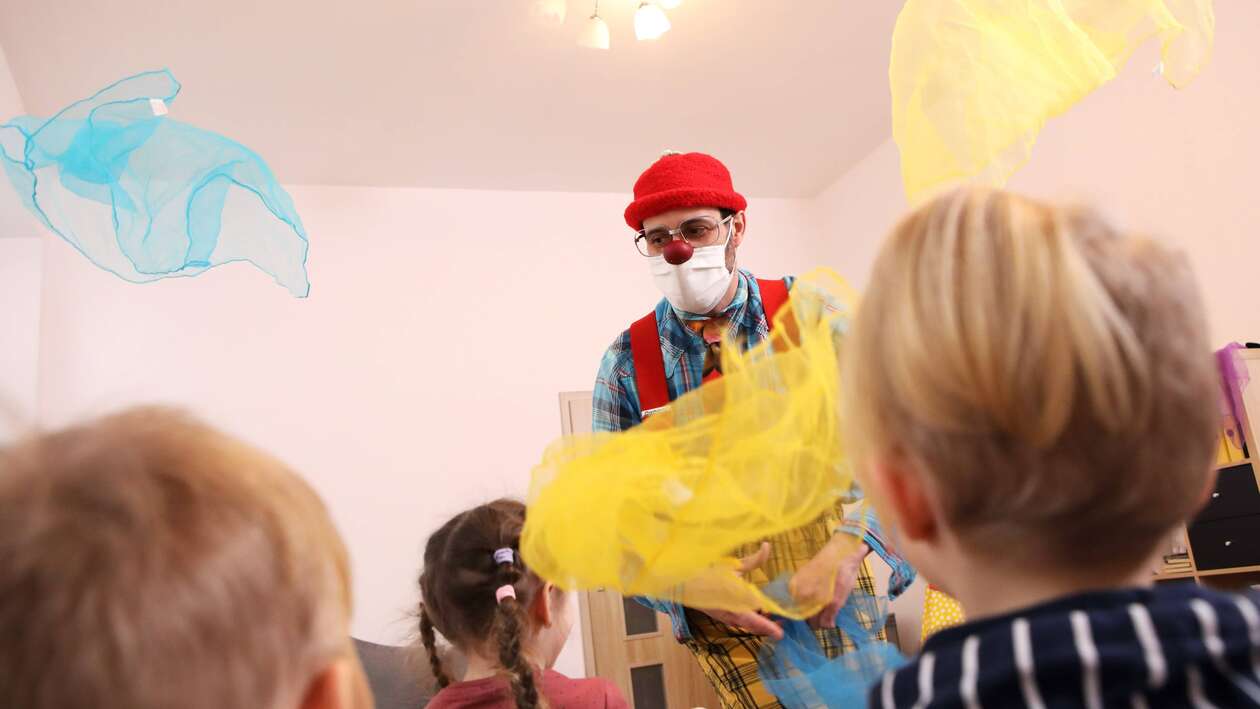Emergency Smile Ukraine: Clowns in the Ukrainian border areas
Wojtek Kowalczyk aka Dr Hilary Gips talks about his first "Emergency Smile" assignment in a temporary arrival center for refugees from Ukraine in Serock/Jadwisin in Poland.
My fellow clowns and I visited one of the reception centers in Poland, which currently mainly accommodate children and their mothers. Our visit there was very emotional for everyone. We could not imagine what awaited us and in what condition (especially psychologically) the children and their mothers would be who had fled Ukraine only a few days earlier.
When we entered the hall, we immediately drew a lot of attention: I played the ukulele, one of my clown colleagues conjured up impressively beautiful soap bubbles, another clown was carrying a large red suitcase. From the first moment we were warmly welcomed by both the children and the adults. The children very quickly and happily joined our merry parade and followed us into the great hall next door, stomping to the rhythm I set on the ukulele. We had prepared a surprise there.
Arriving in the hall, the children, mothers and grandmothers took their seats. We put on a show on a somewhat improvised stage. We could already clearly see how the atmosphere in the large, somewhat cool hall had changed. After our short performance, we all introduced ourselves, standing in a large circle. Some of the adults helped us translate so the language barrier was practically non-existent.
We explained to the children that we would now like to teach them a few clown tricks. I didn't expect it to be so well received! The children immediately approached us and took a close look at our circus equipment. We handed out our souvenirs and a few minutes later there were children everywhere you looked, who were practicing juggling with balls or colorful towels, or just trying to balance and turn a plate on a stick. The hall seemed a lot more colorful and friendlier. We did our rounds, gave the children highly professional clown tips, or even clumsily dropped a ball or two. The mothers also got involved in our jokes and games.
I got the impression that during the three hours we were there, almost everyone in the room momentarily forgot the grim reality. The reality that had brought her to this center.
Without knowing the context of why these people need to be in such a place, one might have assumed that this was a "normal" group of children who are happy to meet clowns. But then there were always moments that reminded us why we were all here. For example, when one of the mothers messaged her husband, who had stayed in Ukraine to defend his homeland, to show him how much fun their child was having. Or when a girl I showed some basic ukulele moves to told me with a sad smile that it's not difficult for her - since she's been playing the violin at home for years. Instead of thinking about her next violin lesson, this girl has to think about whether she will ever be able to return to her homeland, or whether this homeland will still exist at all.
I was very touched by how quickly both the children and their parents trusted us. The willingness to take part in our game, the great interest of the children, their mothers and grandmothers, showed us clearly how much they miss moments of normality in this hall. We felt that for three hours, these children could be in a world that every child should be in every day. In a world where they are not threatened by danger, fear, separation from loved ones and war. In a world where they can discover their previously hidden talents in the game. In a world where the mother watches with a smile and enjoys the moment while her son proudly juggles three balls or a clown magically hides a red nose behind his ear.

